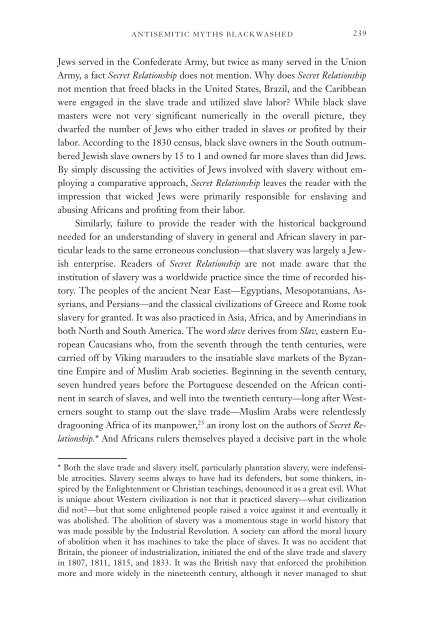41845358-Antisemitism
41845358-Antisemitism
41845358-Antisemitism
Create successful ePaper yourself
Turn your PDF publications into a flip-book with our unique Google optimized e-Paper software.
ANTISEMITIC MYTHS BLACKWASHED<br />
239<br />
Jews served in the Confederate Army, but twice as many served in the Union<br />
Army, a fact Secret Relationship does not mention. Why does Secret Relationship<br />
not mention that freed blacks in the United States, Brazil, and the Caribbean<br />
were engaged in the slave trade and utilized slave labor? While black slave<br />
masters were not very significant numerically in the overall picture, they<br />
dwarfed the number of Jews who either traded in slaves or profited by their<br />
labor. According to the 1830 census, black slave owners in the South outnumbered<br />
Jewish slave owners by 15 to 1 and owned far more slaves than did Jews.<br />
By simply discussing the activities of Jews involved with slavery without employing<br />
a comparative approach, Secret Relationship leaves the reader with the<br />
impression that wicked Jews were primarily responsible for enslaving and<br />
abusing Africans and profiting from their labor.<br />
Similarly, failure to provide the reader with the historical background<br />
needed for an understanding of slavery in general and African slavery in particular<br />
leads to the same erroneous conclusion—that slavery was largely a Jewish<br />
enterprise. Readers of Secret Relationship are not made aware that the<br />
institution of slavery was a worldwide practice since the time of recorded history.<br />
The peoples of the ancient Near East—Egyptians, Mesopotamians, Assyrians,<br />
and Persians—and the classical civilizations of Greece and Rome took<br />
slavery for granted. It was also practiced in Asia, Africa, and by Amerindians in<br />
both North and South America. The word slave derives from Slav, eastern European<br />
Caucasians who, from the seventh through the tenth centuries, were<br />
carried off by Viking marauders to the insatiable slave markets of the Byzantine<br />
Empire and of Muslim Arab societies. Beginning in the seventh century,<br />
seven hundred years before the Portuguese descended on the African continent<br />
in search of slaves, and well into the twentieth century—long after Westerners<br />
sought to stamp out the slave trade—Muslim Arabs were relentlessly<br />
dragooning Africa of its manpower, 25 an irony lost on the authors of Secret Relationship.*<br />
And Africans rulers themselves played a decisive part in the whole<br />
* Both the slave trade and slavery itself, particularly plantation slavery, were indefensible<br />
atrocities. Slavery seems always to have had its defenders, but some thinkers, inspired<br />
by the Enlightenment or Christian teachings, denounced it as a great evil. What<br />
is unique about Western civilization is not that it practiced slavery—what civilization<br />
did not?—but that some enlightened people raised a voice against it and eventually it<br />
was abolished. The abolition of slavery was a momentous stage in world history that<br />
was made possible by the Industrial Revolution. A society can afford the moral luxury<br />
of abolition when it has machines to take the place of slaves. It was no accident that<br />
Britain, the pioneer of industrialization, initiated the end of the slave trade and slavery<br />
in 1807, 1811, 1815, and 1833. It was the British navy that enforced the prohibition<br />
more and more widely in the nineteenth century, although it never managed to shut


